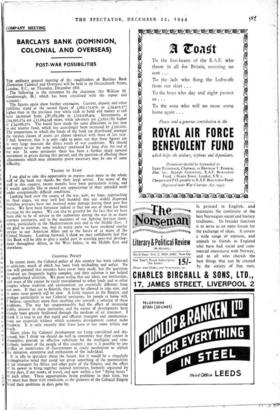COMPANY MEETING
BARCLAYS BANK (DOMINION, COLONIAL AND OVERSEAS)
POST-WAR POSSIBILITIES
THE ordinary general meeting of thz. stockholders of Barclays Bank (Dominion Colonial and Overseas) will be held at 29 Gracechurch Street, London, E.C., on Thursday, December 28th.
The following is the statement by the chairman (Sir William M. Goodenough, Bt.) which has been circulated with the repott and accounts:
The figures again show further expansion. Current, deposit and other liabilities stand at the record figure of £282,175,976, or £34,402,377 higher than in the previous year while cash in hand and money at call have increased from £87,285,289 to L102,028,404. • Investments at [94,593,274 are £11,664,048 more, while advances are £3,631,782 higher at L34,066,571. The board have made the same allocations as last year to our reserve fund, which has accordingly been increased by L500,000. The proportions in which the funds of the bank are distributed amongst the various classes of assets are almost identical with those of last year. I feel, however, that it is only right to point out that these figures are in very large measure the direct result of war conditions. We should not expect to see the same tendency continued for long after the end of the war. In some territories there has been a further sharp upward movement in prices during this period, and the question of effecting those adjustments which may ultimately prove necessary may be one of some difficulty.
THANKS TO STAFF I am glad to take this opportunity to express once more to the whole staff of the bank our thanks for their loyal service. For many of the staff in this country, recent months have been particularly trying, and I would specially like to record our appreciation of their splendid work under. exceptionally difficult conditions. '
Looking back over the course of the war, now, we hope, approaching its final stages, we may well feel thankful that our widely dispersed branches overseas have not received more damage during these past five years. We have been fortunate indeed in that not one of them has been overrun by the enemy. We can also be grateful for the fact that we have been able to be of service to the authorities during the war in so many overseas territories, and to the members of our fighting Services them- selves, particularly in the Mediterranean area and in the Middle East. I am glad to mention, too, that in many parts we have rendered similar service to our American Allies and to the forces of so many of the United Nations. Looking forward, I think we may confidently feel that this Bank will be able to play a useful part in assisting post-war develop- ment throughout Africa, in the West Indies, in the Middle East and elsewhere.
COLONIAL POLICY
In recent years, the Colonial policy of this country has been subjected to criticism, much of which has been bath misleading and unfair. No one will pretend that mistakes have never been made, but the questions involved are frequently highly complex, and their solution is not helped by uninformed criticism. We must realise that our ideas, our institutions, and ways of life cannot be easily transplanted to other lands and to other peoples whose tradition and environment are essentially different from our own. If they are to flourish, they must be allowed to take root, and in some cases growth will be slow. A lively interest in the Empire, and perhaps particularly in our Colonial territories, by people at home will, I believe, contribute more than anything else towards a solution of these problems. The war has unquestionably had the effect of increasing public interest in these territories, and the means of development have already been greatly facilitated through the medium of air transport. I think it is true to say that rapid and efficient transport and communica- tions are essentials without which economic development cannot make headway. It is only recently that these have at last come within our reach.
Many plans for Colonial development are being considered and dis- cussed, but I think we should do well to remember that they cannot in themselves provide an effective substitute for the intelligent and sym- pathetic interest of the people of this country ; nor is it possible by any artifice or contrivance of Government to create mechanism to replace the initiative, enterprise and enthusiasm of the individual.
It is idle to speculate about the future, but it would be a singularly unimaginative mind that could not grasp something of the potentialities Of air transport for Africa and other parts of the Empire, and the effect Of its power to bring together isolated territories, formerly separated by many days, if not weeks, of travel, and now within a few flying hours Of each other. These opportunities bring problems in their train, but we must face them with resolution, as the pioneers of the Colonial Empire faced their problems in days gone by.


























 Previous page
Previous page